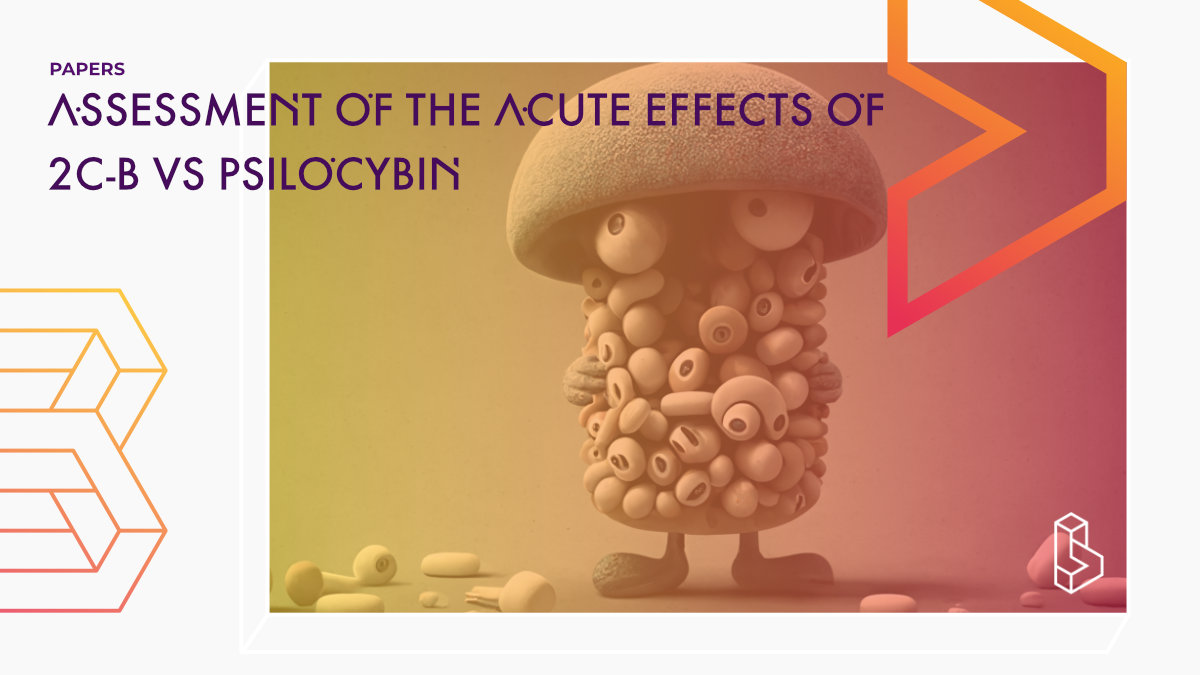This double-blind study (n=22) compares the effect of 2C-B (20mg) and psilocybin (15mg). It finds that 2C-B elicited alterations in consciousness of a psychedelic nature but with a shorter duration of self-reported effects than psilocybin. The study categorised 2C-B (at least at that dose) as a subjectively “lighter” psychedelic.
Abstract of Assessment of the acute effects of 2C-B vs psilocybin
“2,5-dimethoxy-4-bromophenethylamine (2C-B) is a hallucinogenic phenethylamine derived from mescaline. Observational and preclinical data have suggested it to be capable of producing both subjective and emotional effects on par with other classical psychedelics and entactogens. Whereas it is the most prevalently used novel serotonergic hallucinogen to date, it’s acute effects and distinctions from classical progenitors have yet to be characterised in a controlled study. We assessed for the first time the immediate acute subjective, cognitive, and cardiovascular effects of 2C-B (20 mg) in comparison to psilocybin (15mg) and placebo in a within-subjects, double-blind, placebo-controlled study of 22 healthy psychedelic-experienced participants. 2C-B elicited alterations of waking consciousness of a psychedelic nature, with dysphoria, subjective impairment, auditory alterations, and affective elements of ego dissolution largest under psilocybin. Participants demonstrated equivalent psychomotor slowing and spatial memory impairments under either compound compared to placebo, as indexed by the Digit Symbol Substitution Test (DSST), Tower of London (TOL) and Spatial Memory Task (SMT). Neither compound produced empathogenic effects on the Multifaceted Empathy Test (MET). 2C-B induced transient pressor effects to a similar degree as psilocybin. The duration of self-reported effects of 2C-B was shorter than that of psilocybin, largely resolving within 6 hours. Present findings support the categorisation of 2C-B as a subjectively “lighter” psychedelic. Tailored dose-effect studies are needed to discern the pharmacokinetic dependency of 2C-B’s experiential overlaps.”
Authors: Pablo Mallaroni, Natasha L. Mason, Johannes T. Reckweg, Riccardo Paci, Sabrina Ritscher, Stefan W. Toennes, Eef L. Theunissen, Kim P. C. Kuypers & Johannes G. Ramaekers
Summary of Assessment of the acute effects of 2C-B vs psilocybin
Classical psychedelics such as psilocybin are safe and effective treatments for neuropsychiatric disorders such as major depressive disorder. They act via partial serotonin (5-HT) receptor agonism.
While 5-HT2A receptor agonism has been suggested to play a central role in mediating alterations to waking consciousness, evidence suggests that an entourage of receptor subclasses may also explain experiential differences.
Find this paper
Assessment of the acute effects of 2C-B vs psilocybin on subjective experience, mood and cognition
https://doi.org/10.1002/cpt.2958
Open Access | Google Scholar | Backup | 🕊
Cite this paper (APA)
Mallaroni, P., Mason, N. L., Reckweg, J. T., Paci, R., Ritscher, S., Toennes, S. W., ... & Ramaekers, J. G. (2023). Assessment of the acute effects of 2C‐B vs psilocybin on subjective experience, mood and cognition. Clinical Pharmacology & Therapeutics.
Study details
Compounds studied
Psilocybin
2C-X
Topics studied
Healthy Subjects
Study characteristics
Original
Placebo-Controlled
Double-Blind
Within-Subject
Randomized
Participants
22
Humans
Authors
Authors associated with this publication with profiles on Blossom
Natasha MasonNatasha Mason is interested in elucidating the neurobiological and cognitive mechanisms of (psychedelic) drugs by utilizing multimodal study designs, with a particular focus on substances that may hold therapeutic value.
Kim Kuypers
Kim Kuypers is a researcher at Maastricht University. Her work is concerned with understanding the neurobiology underlying flexible cognition, empathy, and well-being. One of the main ways she does is with the use of psychedelics.
Johannes Ramaekers
Johannes Ramaekers is a professor at Maastricht University his work focuses on behavioral toxicology of drugs and combines methods from psychopharmacology, forensic toxicology and neuroscience to determine drug-induced changes in human performance. Some of this research is done with DMT.
Institutes
Institutes associated with this publication
Maastricht UniversityMaastricht University is host to the psychopharmacology department (Psychopharmacology in Maastricht) where various researchers are investigating the effects of psychedelics.
Compound Details
The psychedelics given at which dose and how many times
Psilocybin 15 mg | 1x 2C-X 20 mg | 1xLinked Research Papers
Notable research papers that build on or are influenced by this paper
The forgotten psychedelic: Spatiotemporal mapping of brain organisation following the administration of 2C-B and psilocybinThis pre-print, double-blind, placebo-controlled crossover study (n=22) investigates the neural effects of 2C-B (20mg) compared to psilocybin (15mg) and placebo using 7T resting-state functional MRI. The results reveal that both 2C-B and psilocybin reduce intra-network connectivity while enhancing between-network connectivity, with 2C-B showing less impact on certain connectivity measures but greater transmodal connectivity.
Psilocybin and 4-Bromo-2,5-Dimethoxyphenethylamine (2C-B) at Encoding Distort Episodic Familiarity
This re-analysis of an RCT study (n=20) tested the acute effects of psilocybin and 2C-B on the encoding of emotional episodic memories. The study finds that both psychedelics impair estimates of recollection and familiarity, increase familiarity-based false alarms for emotional stimuli, and affect metamemory, indicating a common neurocognitive mechanism across these drugs.
Linked Clinical Trial
Sub(acute) Profiling of 2C-B Versus PsilocybinThis interventional study, named PREDICT and conducted by Maastricht University, aims to comprehensively evaluate the acute and subacute effects of 2C-B compared to psilocybin and a placebo.
2C-B vs psilocybin Maastricht Study
This trial is registered with the Dutch trial registry that has been offline for over a year and hasn't been registered in any other database. We will update this record once it becomes available. All data are estimates.

